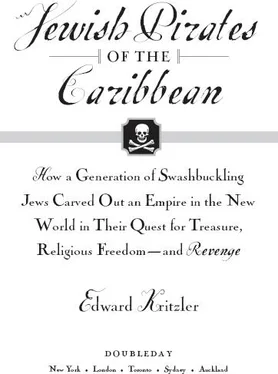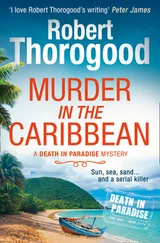Edward Kritzler - Jewish Pirates of the Caribbean
Здесь есть возможность читать онлайн «Edward Kritzler - Jewish Pirates of the Caribbean» весь текст электронной книги совершенно бесплатно (целиком полную версию без сокращений). В некоторых случаях можно слушать аудио, скачать через торрент в формате fb2 и присутствует краткое содержание. Год выпуска: 2008, ISBN: 2008, Издательство: Knopf Doubleday Publishing Group, Жанр: Старинная литература, на английском языке. Описание произведения, (предисловие) а так же отзывы посетителей доступны на портале библиотеки ЛибКат.
- Название:Jewish Pirates of the Caribbean
- Автор:
- Издательство:Knopf Doubleday Publishing Group
- Жанр:
- Год:2008
- ISBN:9780385528368
- Рейтинг книги:3 / 5. Голосов: 1
-
Избранное:Добавить в избранное
- Отзывы:
-
Ваша оценка:
- 60
- 1
- 2
- 3
- 4
- 5
Jewish Pirates of the Caribbean: краткое содержание, описание и аннотация
Предлагаем к чтению аннотацию, описание, краткое содержание или предисловие (зависит от того, что написал сам автор книги «Jewish Pirates of the Caribbean»). Если вы не нашли необходимую информацию о книге — напишите в комментариях, мы постараемся отыскать её.
Jewish Pirates of the Caribbean — читать онлайн бесплатно полную книгу (весь текст) целиком
Ниже представлен текст книги, разбитый по страницам. Система сохранения места последней прочитанной страницы, позволяет с удобством читать онлайн бесплатно книгу «Jewish Pirates of the Caribbean», без необходимости каждый раз заново искать на чём Вы остановились. Поставьте закладку, и сможете в любой момент перейти на страницу, на которой закончили чтение.
Интервал:
Закладка:
Finally, no discussion of Jewish piracy should leave out the Jewish heritage of the famous pirate known to Americans as a hero of the battle of New Orleans. In a handwritten note, stuck in his family Bible, Jean Lafitte wrote: “I owe all my ingenuity to the great intuition of my Jewish-Spanish grandmother, who was a witness at the time of the Inquisition.” Elaborating on his ancestry, Lafitte wrote in his journal:
My mother died before I can remember and my maternal grandmother, who lived with us, became a mother to me…My grandmother was of Spanish-Israelite…My mother’s father had been an alchemist with a good practice and patronage in Spain. He was a freethinking Jew with neither Catholic faith nor traditional adherence to the Jewish synagogue. But this did not prevent him from dying of starvation in prison for refusing to divulge the technical details which the Inquisition demanded from all Jews. Grandmother told me repeatedly of the trials and tribulations her ancestors had endured at the time of the Spanish Inquisition…Grandmother’s teachings…inspired in me a hatred of the Spanish crown and all the persecutions for which it was responsible—not only against Jews. 74
Here our story ends. It is the history of Iberian Jews, disguised as Christians, who pioneered the New World as explorers, conquistadors, cowboys, and pirates, transformed sugar cultivation into an agro-industry that they introduced to the Caribbean, and created the first trade network spanning the seven seas. Figures are imprecise, but it is estimated that conversos numbered around ten thousand in the midseventeenth century, or 5 percent of the 200,000 settlers in the New World, and up to 15 percent in the islands. As they were an underground community, we only know about those targeted by the Inquisition or otherwise exposed. With a heritage of denying their Judaism, most of their descendants eventually abandoned their religion. Of the thousands or more Spanish and Portuguese names listed in the Jamaican telephone book, the island’s declared Jews today number less than two hundred.
The Cohen Henriques brothers and their comrades came of age in Holland, a tolerant oasis in a hostile world. They had heard about the horrors of the Inquisition from their elders, who fled Iberia to settle in Amsterdam. Emulating their mentor, the pirate rabbi Samuel Palache, they were inspired to combat their people’s enemies. In their twenties, using force and diplomacy, they gained a temporary homeland in Brazil, and in their maturity, when the Dutch colony was overrun, they parlayed their trade connections and skills in the production and marketing of sugar and other commodities to ensure their welcome in the islands of the Caribbean. Their economic power in turn enabled them successfully to lobby the Dutch West India Company in support of their children in New Amsterdam, and to secure the intervention of the States General to free their other comrades held in Jamaica. Finally, in Port Royal, as merchants and shipowners they used the buccaneers to wage a successful surrogate war on the lands of the Inquisition that effectively ended Spain’s hegemony in the New World, and in the process they reaped the rewards, both legal and financial.
The Sephardic Diaspora of 1492 was nothing new in the history of a people who for more than two millennia had been wandering the known world. Since the expulsion of the twelve tribes in 722 B.C., the exiled Jews had been forced to develop particular talents that would be welcomed in foreign lands. The Iberian expulsion, far from destroying them, assured their survival. Concurrent with the Age of Discovery, they settled the newly discovered lands, and as world trade grew in importance, so did theirs. Trading with their brethren around the globe, they developed the markets and acquired the secret intelligence national leaders craved as they competed for lucrative trade routes. Menasseh ben Israel, in his appeal to Cromwell, quoted Amos 9:9: “I will sift the house of Israel among all the nations as corn is sifted in a sieve,” and cemented his argument with an economic promise: Welcome us and we will make you rich. Today, centuries later, it is this promise of entrepreneurial wealth that still protects the People of the Book in an indifferent and often hostile world.
The search for the “lost gold mine” of Columbus was a last hurrah of the Jewish merchant adventurers, an adventure that failed. Not so the cause to which the Cohen brothers and their peers had devoted most of their lives. In 1675, the very year the brothers were battling each other in court, Jewish houses of worship were opened in Amsterdam and London, and the following year in Curaçao, Barbados, and Jamaica. It was thanks largely to their efforts spanning most of the seventeenth century that the barriers to Jewish residency and commercial rights were surmounted and Jews were finally free to be Jews in both the Old World and the New.
EPILOGUE: SEARCHING FOR THE LOST MINE OF COLUMBUS
I was in Jamaica’s archival vault, a cavernous, dimly lit room, with row upon row of ceiling-high shelves filled with leather-bound ledgers dating back three and a half centuries. Perusing an early index of Sephardic names, I came across an obscure reference to a land deed assigned to Abraham Cohen. It was dated February 7, 1671—seven years after the king banished Cohen “off Our said Island never to reside or trade there again.” 1
The date didn’t make sense; was the deed misdated? I took down the appropriate ledger for the years 1670–75, and there it was, or rather there they were, for along with Cohen’s deed was another document, so remarkable I got chills reading it. Cohen’s land title was indeed dated seven years after his banishment for failing to find the legendary mine. So he had come back to the island; but why? In 1670, Cohen was in his sixties and living in Amsterdam with a second wife and three young children. He was wealthy beyond need, so why had he crossed thousands of miles of ocean to an island from which he’d been expelled? As I pondered this, I turned to the back of the ledger to see how far it ran. A few pages before the end, the book fell open to a curious entry labeled “Cohen vs. Cohen,” dated May 1675. I read the opening passage; I then read it again because I could not believe what I was reading. There before me, on crumbling parchment, was the settlement of a 1675 lawsuit that identified Abraham Cohen as the brother of the pirate Moses Cohen Henriques.
I had followed the careers of Abraham Cohen and Moses Cohen Henriques for years, but no historian or document I consulted had previously linked them in any way. This was the first time I became aware these two Jewish pioneers were brothers. Equally startling was the discovery that in their old age they were both in Jamaica apparently arguing over land that possibly contained Columbus’s lost gold mine. The discovery also meant that the very man sponsoring my research was, unbeknownst to him, the brothers’ descendant, and if the gold hunt proved successful, a rightful claimant to Columbus’s mine.
A year before, Ainsley Henriques had given me a grant to research Jamaica’s early Jewish history. He was then chairman of the Jamaica National Heritage Trust. In conversing with him, I had talked about the fantastic deeds of the pirate warrior Moses Cohen Henriques, how he had sailed with Piet Heyn in the capture of the Spanish silver fleet, then led the Dutch invasion of Brazil and afterward commandeered an offshore island for his marauding. When Ainsley told me that he too was a Cohen Henriques, I was surprised, but thought it possible that when Moses was forced out of Brazil, he wound up in Jamaica during the heyday of piracy and begat some offspring. I later found his wife’s name in a list of graves of the island’s oldest Jewish cemetery. She had died in Port Royal, around the time of the 1692 earthquake, and her tombstone read, “Snr. Moses Cohen Henriques (Esther).”
Читать дальшеИнтервал:
Закладка:
Похожие книги на «Jewish Pirates of the Caribbean»
Представляем Вашему вниманию похожие книги на «Jewish Pirates of the Caribbean» списком для выбора. Мы отобрали схожую по названию и смыслу литературу в надежде предоставить читателям больше вариантов отыскать новые, интересные, ещё непрочитанные произведения.
Обсуждение, отзывы о книге «Jewish Pirates of the Caribbean» и просто собственные мнения читателей. Оставьте ваши комментарии, напишите, что Вы думаете о произведении, его смысле или главных героях. Укажите что конкретно понравилось, а что нет, и почему Вы так считаете.












